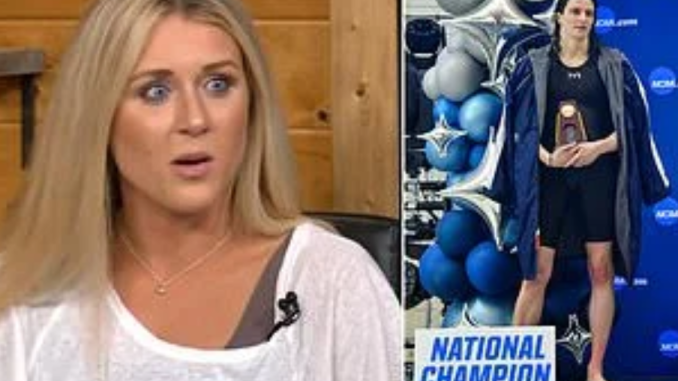
A former college swimmer who competed against Lia Thomas has told of her ‘extreme discomfort’ at changing next to the transgender athlete because of Thomas’s ‘different parts.’
In a new interview with Tucker Carlson on the host’s Fox News Digital show, former University of Kentucky swimmer Riley Gaines accused organizers of not disclosing that Thomas would be using the female changing facilities.
She told Carlson on the latest edition of ‘Tucker Carlson Today: ‘That’s not something we were forewarned about, which I don’t think is right in any means, changing in a locker room with someone who has different parts.’
The 2022 graduate of the University of Kentucky continued: ‘So not only were we forced to race against a male, we were forced to change in the locker room with one.’
Gaines went on: ‘And so then we’re sitting there not even knowing who to talk to, who to complain to, because this kind of all happened behind the scenes and very discreetly.’
Speaking to Carlson, Gaines accused the National Collegiate Athletic Association of a ‘huge lack of accountability’ in the protecting the integrity of women’s sports.
Gaines, who has been competing since she was ten, tied with Thomas for fifth place in the 200-yard freestyle NCAA championships in March.
Since then, Gaines has been outspoken in her opposition to Thomas’ presence in women’s races. On July 27, Gaines was confirmed as a speaker at the Conservative Political Action Conference in Dallas in August.
Since first coming forward against Thomas’ participation in the women’s section, Gaines said: ‘I have received so much support, like it’s insane. Which tells me who the majority is, what the general population thinks even if you’re not an athlete, if you’re not a female. It’s like we said – common sense.’
The NCAA Woman of the Year nominee said that all of the good swimmers in the country know who the other good swimmers are. She said: ‘Your better swimmers know of your better swimmers regardless of what school or what conference you’re at.’
She continued: ‘You compete internationally together. Even if you’re not on the same collegiate team, you’ve probably been on teams together before.’
In her interview, Gaines, a native of Gaitlin, Tennessee, said that she first learned of Lia Thomas’ identity in November 2021.
She told Carlson: ‘All of a sudden, out of nowhere, there’s this article posted that says, ‘Lia Thomas, swimmer at UPenn, posts 1.41 200m freestyle,’ which is a very, very fast time.’
It was then that Gaines found out that for the previous three years, Thomas was competing in the men’s NCAA division.
Gaines said: ‘I kind of just went about my training because I was like, this is a good thing maybe. But, turns out, two weeks before our national championships, the NCAA announced Lia will be competing with the females, and I was just like, mind blown.’
She added: ‘I think people forget that women’s sports were a protected group. The category was made because the playing field was not level by any means when you have them competing against men.’
When Thomas was nominated for NCAA Woman of the Year in 2022, Gaines tweeted that the nomination is ‘another slap in the face to women’ and that the ‘NCAA has made this award worthless.’
‘[T]his is yet another slap in the face to women. First a female national title and now nominated for the pinnacle award in collegiate athletics. The NCAA has made this award worthless,’ Gaines wrote.
Gaines and Thomas famously tied for fifth place in the women’s 200-meter NCAA championships in March, but as there was only one trophy, Gaines was told by the event’s organizers that the trophy would be given to Thomas, while hers would be mailed at a later time.
Gaines wasn’t the only female athlete to tweet her outrage.
Navratilova, who has won the most major titles in women’s tennis in the Open Era, also took to Twitter to deride the nomination.
‘Not enough fabulous biological women athletes, NCAA?!? What is wrong with you?!!!!!!!?’ she tweeted.
Back in April, Gaines told Tucker Carlson in an interview: ‘I know just talking to tons, and tons of NCAA swimmers that their athletic directors, their media people and their coaches or other outside influencers have told them “don’t say anything, just avoid the situation, save face a little bit”.
‘But I’m just fortunate enough to have such an amazing support system at the University of Kentucky, whether that be from the athletic director all the way down to my head coach,’ Gaines explained.
‘But just speaking for them it’s just totally wrong. I know I can’t speak for everyone but I’m almost certain that I’m speaking for large majority of female athletes and this is just not okay. And it’s not fair. ‘We’re dealing with something that’s completely out of our control when we’re racing, biological males whether they have different lung capacities, their height, testosterone levels whether they’ve used testosterone blockers are not.
‘It doesn’t suppress going through puberty as a male. Especially Lia who swam for three years as a male. It’s completely unfair and it’s a matter of equity really.’
Lia Thomas started taking hormone therapy while she was still competing as a male back in May 2019.
Under USA Swimming rules, athletes had to have recorded low levels of testosterone for 36 months to compete in the female category.
That meant that Thomas didn’t qualify for the NCAA championship, if they followed USA Swimming rules – as they originally said they would.
But the NCAA said that she would be allowed to compete because they were refusing to adopt the threshold in 2021.
The NCAA committee said: ‘The subcommittee decided implementing additional changes at this time could have unfair and potentially detrimental impacts on schools and student-athletes intending to compete in 2022 NCAA women’s swimming championships.’
It is unclear what they will do next year, however.
* Article from: dailymail.co.uk